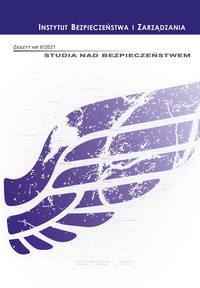Abstrakt
Artykuł koncentruje się na efektywności globalnych struktur zarządzania w obszarze bezpieczeństwa na tle narastającej konfrontacji między potężnymi graczami geopolitycznymi, napięć między krajami bogatymi i biednymi oraz walki o zasoby i rynki. Celem artykułu jest określenie roli i zarysowanie perspektyw globalnego zarządzania bezpieczeństwem, w szczególności na przykładzie odpowiednich instrumentów ONZ. Rada Bezpieczeństwa ONZ jest postrzegana jako instrument utrzymywania pokoju. Nakreślono jej status i uprawnienia. Operacje pokojowe ONZ są uważane za zjawisko systemowe. Zidentyfikowano problemy, które negatywnie wpływają na skuteczność i powodzenie operacji pokojowych oraz tendencje w dalszym rozwoju działań pokojowych sił ONZ. Te ostatnie powinny być gotowe do szybkiego podjęcia zadania neutralizacji zagrożeń i unikania konfliktów zbrojnych. Twierdzi się, że system bezpieczeństwa wymaga reorganizacji i usprawnienia poprzez rozbudowę sił pokojowych ONZ oraz tworzenie nowych wspólnych formacji wojskowych na stałe.
Bibliografia
Bah S., Peace Operations Partnerships: Lessons and Issues from Coordination to Hybrid Ar- rangements/ A. Sarjoh Bah, Bruce D. Jones, “Center on international cooperation”, http:// www.cic.nyu.edu/internationalse-urity/docs/peace_hybrid.pdf.
Beardsley K. & Gleditsch K.S., Peacekeeping as conflict containment. “International Studies Review”, 2015, № 17 (1).
Filipchuk V., Preventive diplomacy, peacekeeping, peace support and peacebuilding in the settlement of the Ukrainian conflict, Kyiv 2016, http://www.icps.com.ua//eu/.pdf, [access: 02.03.2022].
Gaidai D., Zarembo K., Litra L., Lymar O., Litvinenko J., Medinsky I., Peacekeeping mission in Donbass: what the world experience tells Ukraine, “European truth”, March 18, 2016, https://www.eurointegration.com.ua/articles/2016/03/18/7046393/, [access: 02.03.2022].
Gogosha O., Evolution of UN peacekeeping activities at the turn of the XX–XXI centuries, http://www.pdaa.com.ua/np/pdf5/1.pdf, [access: 02.03.2022].
Gogosha O., Formation of the concept and principles of UN peacekeeping, “Bulletin of Lviv University. Series: International Relations”, 2012, Vip. 30, http://nbuv.gov.ua/UJRN/ VLNU_Mv_2012_30_16, [access: 02.03.2022].
Hegre H., Hultman L. & Nygard H.M., Evaluating the conflict-reducing effect of UN peaceke- eping operations, 2018, https://www.pcr.uu.se/digitalAssets/653/c_653796-l_1-k_pko_ prediction_preprint_main.pdf, [access: 02.03.2022].
Hudson J., University of Bath, The Future of Reserve Currencies, 2017, https://www.imf.org/ external/pubs/ft/fandd/2009/09/pdf/cohen.pdf, [access: 02.03.2022].
Hultman L., Kathman J. & Shannon M., Beyond keeping peace: United Nations effectiveness in the midst of fighting, “American Political Science Review” 2014, No. 108(4).
Kalyayev A., Novak-Kalyayeva L., Stukalin T., Motornyy V., Rudenko L. Imperatives of glo- bal governance in the field of military security: the European context and Ukraine, /Pro- ceedings of the 38th International Business Information Management Association Confe- rence (IBIMA) 23–24 November 2021, Sevilla, Spain, ISSN: 2767-9640.
Klyuyev K.G., International peacekeeping operations as a political tool for resolving military-political conflicts, “Political science” 2016, № 10 (37).
Kovtun O., UN peacekeeping activities in the XXI century, “Current issues of international relations” 2011, Vip. 96 (1), http://nbuv.gov.ua/UJRN/apmv_2011_96%281%29 20, [access: 02.03.2022].
Lega A.Yu., The essence of peacekeeping operations (peacekeeping operations). http://www. rusnauka.com/14_APSN_2008/Istoria/32133.doc.htm.
Lysak Ya M., International legal bases of application of units of the Armed Forces of Ukraine abroad and problems of their implementation on the example of peacekeeping operations in Yugoslavia and Iraq, “Legal Bulletin” 2014, № 2 (31).
Morrison A., Cumner S., Park H. & Zoe K.A., Peacekeeping, [In:] Encyclopedia of violence, peace, and conflict, L. Kurtz (ed.), London: Academic Press 1999.
NATO operations, Kyiv: Knowledge TV of Ukraine 2007, ISBN 978-966-618-249-7.
Nsia-Pepra K., UN robust peacekeeping: civilian protection in violent civil war, New York: Palgrave Macmillan 2014. DOI: 10.1057/9781137463135.
On the Strategy of International Peacekeeping Activities of Ukraine: Decree of the President of Ukraine of June 15, 2009 № 435–2009. https://zakon.rada.gov.ua/laws/show/435/2009,[access: 02.03.2022].
UN Security Council Resolutions (1992 р.). http://www.un.org/ru/sc/documents/resolutions/, [access: 02.03.2022].
United Nations Charter, http://zakon3.rada.gov.ua/laws/show/995_010.
Wojciechowski A.V., Cybersecurity as an important component of the national securi- ty protection system of European countries, “Journal of Eastern European Law” 2018, № 53, http://easternlaw.com.ua/wp-content/uploads/2018/07/voytsikhovskyy_53.pdf, [ac- cess: 02.03.2022].
Zarembo K., Strategic partnerships without strategy, or Why this tool does not work in Ukraine’s favor, http://www.day.kiev.ua/uk/article/panorama-dnya/strategichni- partner- stva-bez-strategiyi, [access: 02.03.2022].
Zgurovets V.G., Safoshkina L.V., Kalachova V.V., Prospects of peacekeeping activity of Ukra- ine and ways to improve the mechanism of legal regulation of participation of the Armed Forces of Ukraine in peacekeeping operations, “Honor and law” 2020, № 1 (72) / 2020, http://chiz.nangu.edu.ua/issue/view/12267/6329.

Utwór dostępny jest na licencji Creative Commons Uznanie autorstwa 4.0 Międzynarodowe.
Copyright (c) 2021 Array

